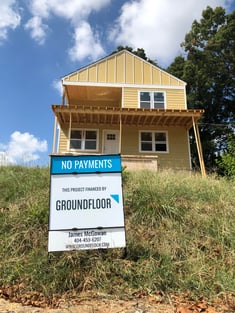One of the biggest factors that sets us apart from other real estate investing platforms is that we are the first and only platform qualified by the US Securities & Exchange Commission (SEC) to offer debt-secured real estate investing opportunities to everyone -- not just the wealthiest. Our platform is different in that it allows everyday investors the chance to invest fractionally in residential real estate projects. With a $1000 minimum investment, investors can pick which projects to invest in and how much to invest in each, creating their own unique portfolio based on their risk tolerance and financial goals. But how exactly is that possible? What enabled us to create such a groundbreaking investing experience? The answer can be found in recent changes to US securities law.
Background
 Under US law, investments are able to be sold to the general public under very specific terms. Investors are broadly divided into two categories -- accredited and non-accredited. An accredited investor is a person who has a net worth of more than $1 million not including their primary residence or an annual income of more than $200,000, and who is sophisticated enough to protect their interests in financial transactions. A non-accredited investor, therefore, is anyone that doesn’t meet the above requirements -- and as you may imagine, the vast majority of people fall into this category.
Under US law, investments are able to be sold to the general public under very specific terms. Investors are broadly divided into two categories -- accredited and non-accredited. An accredited investor is a person who has a net worth of more than $1 million not including their primary residence or an annual income of more than $200,000, and who is sophisticated enough to protect their interests in financial transactions. A non-accredited investor, therefore, is anyone that doesn’t meet the above requirements -- and as you may imagine, the vast majority of people fall into this category.
The SEC regulates the sale of investment securities to non-accredited investors very closely to protect them from fraud and misrepresentations. Under a piece of securities law called Regulation A, companies interested in offering securities to non-accredited investors are required to disclose a large amount of financial information -- both about the securities being offered and about the company offering them -- on a regular basis so those interested in investing can have the necessary information to make an informed decision. But putting together the systems and processes necessary to create such regular disclosures is time-consuming and costly. Selling securities to accredited investors, however, is exempted from such regulation; as a result, many companies elect to bypass the regulatory requirements of selling to non-accredited investors and instead sell investment products to accredited investors only.
The Passage of the JOBS Act
In April of 2012, the Jumpstart Our Business Startups (JOBS) Act was signed into law. Included in the bill was a set of amendments to Regulation A that aimed to make it more appealing to issuers of investment securities. Prior to these new amendments, businesses were only able to offer investments to non-accredited investors that totaled $5 million during each 12-month period. Many businesses felt this was not worthwhile, as the $5 million cap did not adequately offset the expenses incurred in putting together the disclosures for the transaction.
The passage of the JOBS Act raised the cap from $5 million to $50 million, making it much more financially feasible for companies to comply with federal securities law to sell to non-accredited investors. Under this new law, companies are able to offer securities to the general public that total $50 million each 12-month period. They are still required to produce regular public financial disclosures, but because the new cap is much higher, the costs incurred in preparing these disclosures are easier to amortize. As a result, many companies rushed to take advantage of the JOBS Act and the market space it opened.
Real Estate Investing For Everyone
 The real estate market was one such space. Notwithstanding REITs and direct investment, investing in real estate projects has traditionally been the domain of the wealthy, largely because many real estate investment opportunities took advantage of the accredited investor exemptions. Put another way, real estate investing (and companies offering real estate investments) was never compliant with federal securities law because it did not have to be. Issuers would simply limit the sale of real estate securities to accredited investors, since selling to this group was not subject to the same federal regulations. As a result, for a long time, only the wealthy had access to the most lucrative real estate investments. Everyday individuals -- aka non-accredited investors -- were essentially locked out from participating. The end result? The rich continued to get richer using real estate, while everyone else was forced to watch from the sidelines.
The real estate market was one such space. Notwithstanding REITs and direct investment, investing in real estate projects has traditionally been the domain of the wealthy, largely because many real estate investment opportunities took advantage of the accredited investor exemptions. Put another way, real estate investing (and companies offering real estate investments) was never compliant with federal securities law because it did not have to be. Issuers would simply limit the sale of real estate securities to accredited investors, since selling to this group was not subject to the same federal regulations. As a result, for a long time, only the wealthy had access to the most lucrative real estate investments. Everyday individuals -- aka non-accredited investors -- were essentially locked out from participating. The end result? The rich continued to get richer using real estate, while everyone else was forced to watch from the sidelines.
Following the passage of the JOBS Act, businesses focused on offering real estate opportunities to the neglected non-accredited investor class rushed to fill the void. Online platforms like Groundfloor opened up to accommodate non-accredited investors under the new provisions, and everyday investors were thrilled at the opportunity to add real estate to their portfolios.
However, though these companies were now required to disclose financial information on securities offered to non-accredited investors under Regulation A, several parts of the investment process still remained opaque. The vast majority of companies currently offering real estate investments are structured as real estate investment trusts, or REITs. Money invested in a REIT is pooled and goes into many different real estate projects that are owned or operated by the REIT; as such, the company -- not the investor -- makes the decisions about which projects to fund and how much of an investor’s money to put towards each project. Ultimately, investors rely on the REIT itself to pick appropriate investment properties and to manage risk; in this way, everyday investors are still barred from having complete control over their investment portfolios. Many of these REIT based offerings also self deal, meaning that the companies offering the REIT may also be the project managers, leasing agents, or property managers for the underlying properties, and they don’t always disclose this fact.
The Groundfloor Difference
.jpg?width=312&name=1%20(22%20of%20237).jpg) All of that changed with Groundfloor. We founded our company in 2013 on the premise that everyone -- not just the wealthiest -- should have access to the real estate investing space to build wealth. Furthermore, everyone should have the option to choose exactly which projects their money goes towards, and how much goes towards each one. That’s why we are the first platform qualified by the SEC to offer loan-based real estate investment opportunities that everyone can invest in for only a $1000 minimum investment. Investors on our platform can create their own customized portfolios that are tailored to their unique financial situation and risk tolerance, instead of relying on a REIT manager to make those decisions for them.
All of that changed with Groundfloor. We founded our company in 2013 on the premise that everyone -- not just the wealthiest -- should have access to the real estate investing space to build wealth. Furthermore, everyone should have the option to choose exactly which projects their money goes towards, and how much goes towards each one. That’s why we are the first platform qualified by the SEC to offer loan-based real estate investment opportunities that everyone can invest in for only a $1000 minimum investment. Investors on our platform can create their own customized portfolios that are tailored to their unique financial situation and risk tolerance, instead of relying on a REIT manager to make those decisions for them.
Making this possible for our customers requires disclosing a lot of information, not just about each individual project we finance but also about our company in general. We publicly share our audited financial statements, management updates about the state of the company, risk disclosures customized for each individual project and for our company overall, and a biannual risk analysis of our business performance. Furthermore, we’ve developed a proprietary grading algorithm to help investors more easily understand the risk profile of each project on our platform.
Of course, disclosing much of this information is required under SEC regulations for non-accredited investor offerings, but we also believe this sort of transparency should be common practice across all investment platforms. Customers deserve to have as much information as possible, both about the investments themselves and about the company hosting the investments.
In fact, we believe so strongly in this transparency that you can access all the company information described above online whenever you want -- even if you aren’t a customer. Further, we also regularly perform and publish other analyses of our company’s performance, the range of returns investors see on our platform, the historical and current performance of our loans, and detailed monthly reports of loan repayments and asset management activities. No other real estate investment platform allows this degree of insight into company metrics to non-accredited investors -- but that’s what we’ve done since day one, and what we will always do.
Ready to get started adding real estate to your portfolio? Join Groundfloor today to create your own customized portfolio of private real estate investment opportunities and start building wealth for your future.



